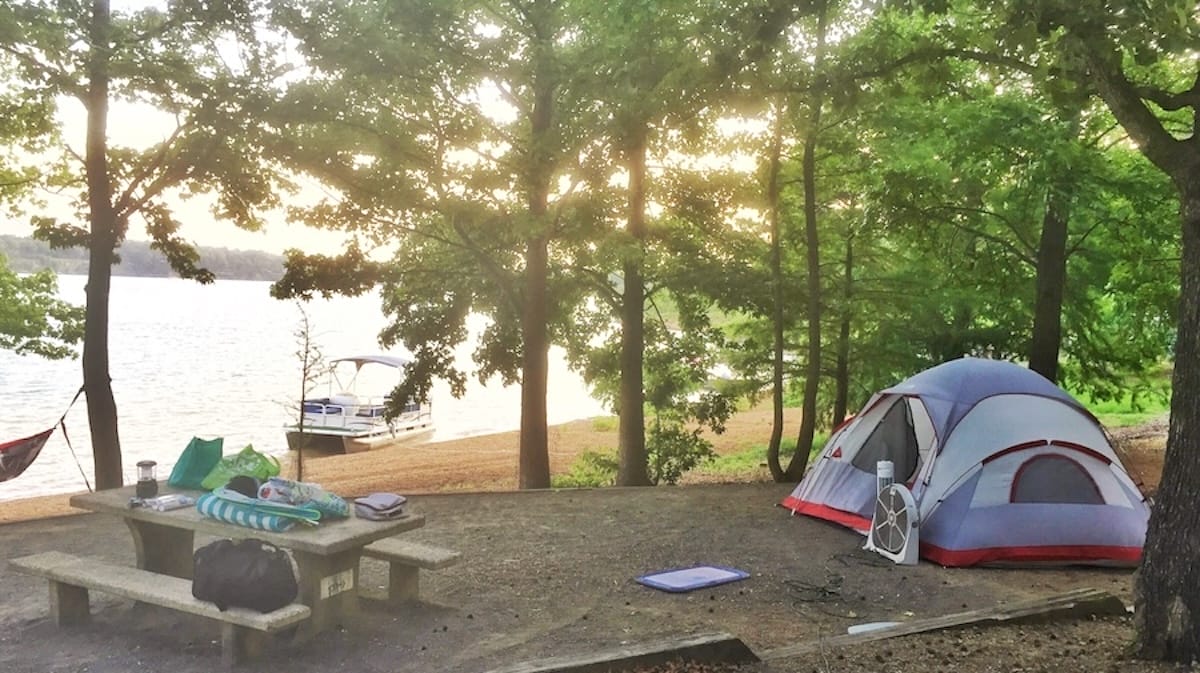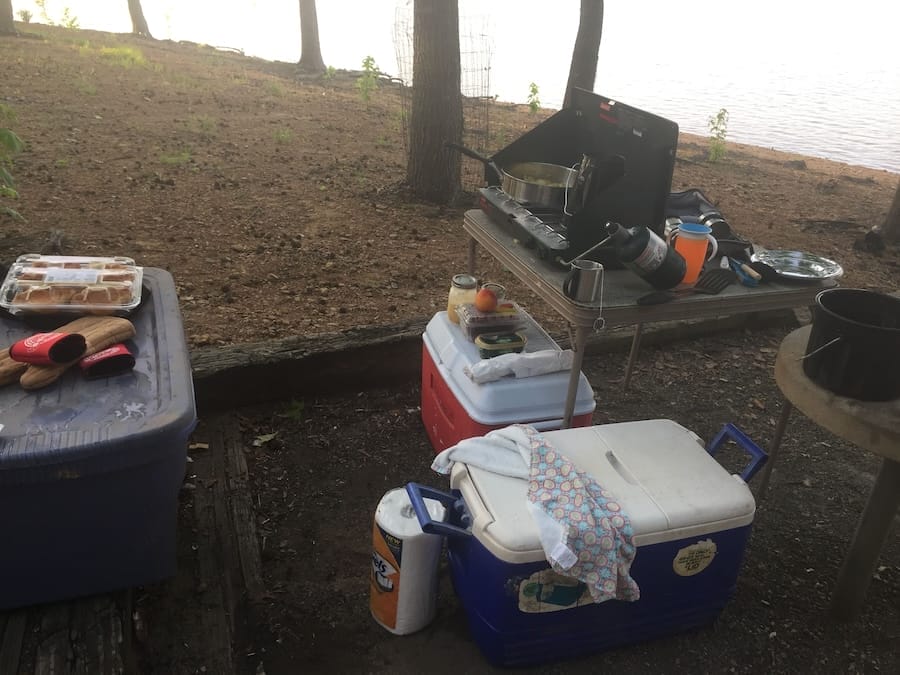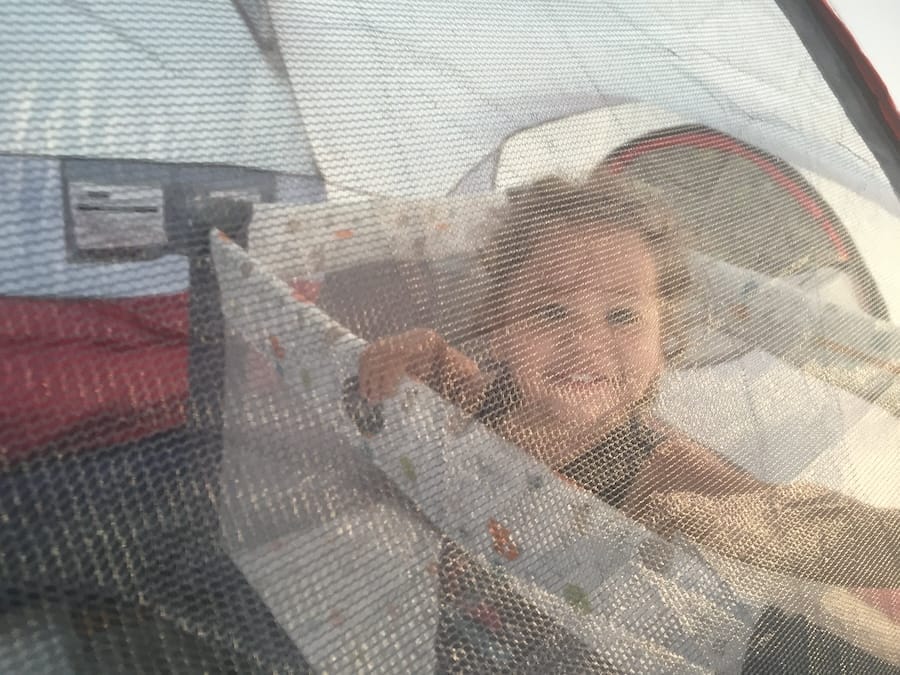

Uh oh...
It appears that you're using a severely outdated version of Safari on Windows. Many features won't work correctly, and functionality can't be guaranteed. Please try viewing this website in Edge, Mozilla, Chrome, or another modern browser. Sorry for any inconvenience this may have caused!
Read More about this safari issue.

Camping is a fantastic way to escape real life and connect with nature for a few days. For families, it’s an opportunity to create lasting memories, bond over campfires, and enjoy the simplicity of the great outdoors.
Arkansas boasts a long camping season. It is home to thirty-two state parks with campgrounds and hundreds of Army Corp of Engineers campgrounds, WMA campsites, primitive sites and privately owned campgrounds. Planning your camping trip in Arkansas allows you to see many new places.
No matter where you are heading, packing for a camping trip, especially when you’re tent camping, can be daunting. When my son George was just 18 months old, we embarked on our first family camping adventure. Between the tent, food, cooking supplies and everything a toddler needs, our car was so jam-packed we could barely see George in his car seat in the back. We, like many, had overpacked.
Over the years, I’ve learned that the key to a successful camping trip is in the packing. It’s about finding that sweet spot between having all the essentials and not overwhelming yourself with unnecessary items. Here are some tips and suggestions to help you pack efficiently and effectively for your next camping trip.
Tips and Suggestions for Packing
- Plan Ahead: Make a checklist of everything you think you might need. This helps you stay organized and ensures you don’t forget any crucial items.
- Prioritize Essentials: Focus on the basics first – shelter, food, clothing and safety. Once you have these covered, you can think about additional comforts and extras.
- Use Multi-Purpose Items: Bring items that can serve multiple functions. For example, a bandana can be used as a washcloth, a headband or a potholder.
- Pack Smart: Use soft-sided bags instead of hard cases to save space. Roll clothes instead of folding them to maximize space in your bags.
- Keep It Simple: Remember, you’re going camping, not moving. Simplify your meals, pack lightweight clothing, and only bring what you’ll truly use.
- Check the Weather: Knowing the forecast can help you pack appropriately. Bring layers for changing temperatures and waterproof gear if rain is expected.
Essential Items for Tent Camping
- Tent: Ensure it’s large enough for your family and check for any necessary repairs or missing parts before you leave.
- Sleeping Gear: Sleeping bags, sleeping pads and pillows. Consider an extra blanket for chilly nights.
- Cooking Supplies: Portable stove or grill, fuel, pots and pans, utensils, plates and cups. Don’t forget a cooler with ice packs to keep perishables fresh.
- Food and Water: Plan your meals ahead of time. Bring plenty of snacks and water.
- Clothing: Pack for all weather conditions – layers, hats, gloves and rain gear. Don’t forget swimsuits if there’s a swimming spot!
- Personal Items: Toiletries, medications, sunscreen and insect repellent.
- Lighting: Flashlights, headlamps and extra batteries. A lantern for the campsite can be very useful.
- First Aid Kit: Make sure it’s well-stocked with bandages, antiseptics, tweezers and any personal medications.
- Tools and Repair Kits: A multi-tool, duct tape and tent repair kit can save the day in case of minor equipment failures.
- Recreation Gear: Depending on your plans, bring fishing gear, hiking boots or books and games for downtime.
If You Have Room
- Camp Chairs: For comfortable seating around the campfire.
- Hammock: Perfect for lounging and relaxing.
- Portable Fan: For warm nights and to keep away flies and mosquitos.
- Extra Tarp: Useful for additional shelter or as a ground cover.
- Camping Table: I bring an extra table to use for my camp kitchen.
- Binoculars: Great for bird watching or enjoying scenic views.
- Extra Lighting: Additional lanterns or string lights to brighten up your campsite.
- Games and Entertainment: Deck of cards, board games or a frisbee for family fun.
- Fishing Gear: Bring a few rods and some tackle. You might even catch your dinner.
- Camera: To capture all the memories of your adventure.
- Water Toys: From pool floats to kayaks and stand-up paddle boards, sand toys and beach towels, water toys help you cool off and provide a fun activity. Brush up on your water safety, and don’t forget your water safety, and don’t forget your PFDs.

More on Camping
7 Best Remote Tent Camping Sites in Arkansas
12+ Fun Camping Activities in Arkansas
Dispersed Camping in the Natural State
Packing for a camping trip doesn’t have to be overwhelming. By planning ahead, prioritizing essentials, and packing smartly, you can ensure you have everything you need without overpacking. Remember, the goal is to enjoy the outdoors and make memories with your loved ones. Leaving behind a few of the comforts of home adds to the sense of adventure and only makes coming home that much sweeter. Or you can do what we did and upgrade to an RV. Then camping is as easy as tossing some food in the fridge and hitching up to the truck.
Join the Conversation
Leave a Comment
One response to “Packing for Your Arkansas Camping Trip”
 Leave a Reply
Leave a Reply
We do the work.
You check your email.
Sign up for our weekly e-news.
Get stories sent straight to your inbox!
















 Leave a Reply
Leave a Reply
[…] Packing for Your Arkansas Camping Trip […]